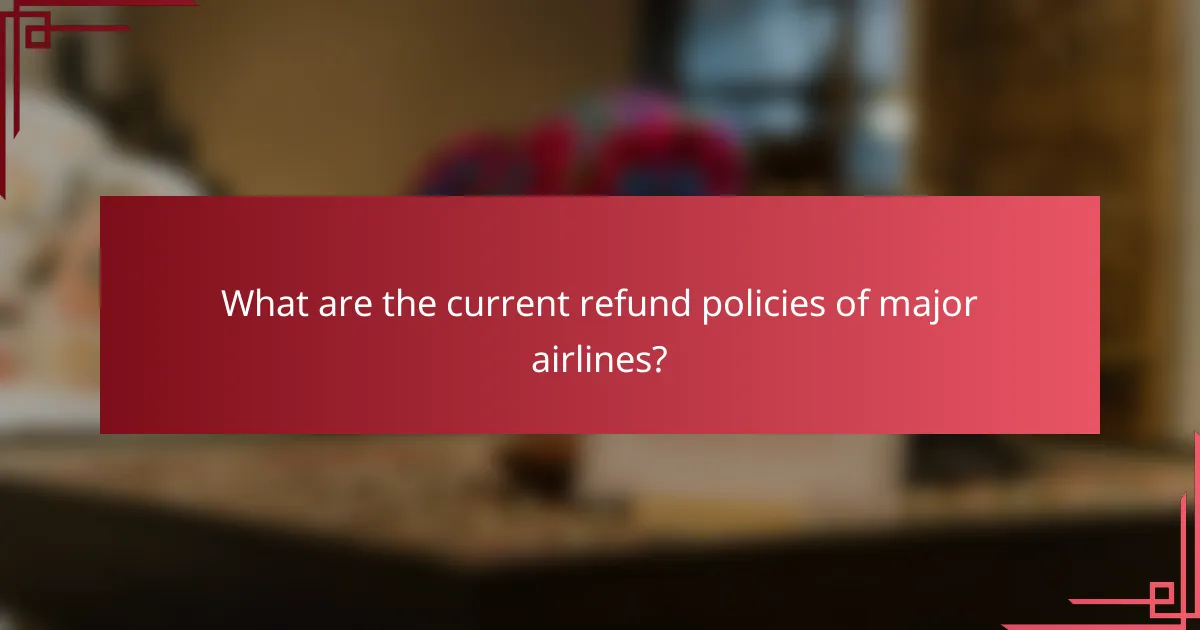The COVID-19 pandemic has profoundly influenced ticket booking services, prompting many companies to revise their refund policies to offer greater flexibility and extended deadlines. As travelers navigate uncertainties, major airlines and event organizers have adapted their terms, resulting in a wide range of options for refunds and changes. Understanding these evolving policies, along with the benefits of ticket insurance, is crucial for consumers seeking financial protection against unforeseen disruptions.

How has COVID-19 affected ticket booking refund policies?
COVID-19 has significantly impacted ticket booking refund policies, leading to more flexible terms and extended deadlines. Many companies have adapted their policies to accommodate travelers and event-goers facing uncertainties due to the pandemic.
Increased flexibility in cancellations
Many ticket booking services have introduced increased flexibility in cancellation policies. This means that travelers can often cancel their tickets closer to the departure date without incurring hefty fees. For example, airlines may allow cancellations up to 24 hours before a flight without penalties.
This flexibility extends to various sectors, including travel, concerts, and sporting events, allowing customers to make changes without financial loss during these unpredictable times.
Extended deadlines for refunds
Refund deadlines have been extended significantly across the industry. Previously, customers might have had a limited window to request refunds, but many companies now allow requests for several months after the original purchase date. This change provides customers with more time to assess their travel plans.
For instance, some airlines have moved from a 30-day refund window to 90 days or more, accommodating the ongoing uncertainties related to travel restrictions and health concerns.
Changes in airline policies
Airlines have made substantial changes to their refund policies in response to COVID-19. Many have eliminated change fees for domestic flights, making it easier for passengers to adjust their travel plans without incurring additional costs. This shift is particularly beneficial for those who may need to alter their itineraries due to health guidelines.
Additionally, some airlines have implemented more generous policies for refunds on non-refundable tickets, allowing customers to receive credits or full refunds under certain circumstances related to the pandemic.
Impact on event ticketing
The event ticketing industry has also seen significant changes due to COVID-19. Many event organizers now offer full refunds or credits for postponed or canceled events, which was not always the case before the pandemic. This shift aims to build trust with customers who are hesitant to purchase tickets amid ongoing uncertainties.
Furthermore, some platforms have introduced insurance options that cover cancellations due to COVID-19, providing an additional layer of security for ticket buyers.
Variability by region
Refund policies can vary significantly by region, influenced by local regulations and market conditions. In Europe, for example, regulations may require airlines to offer refunds for canceled flights, while in other regions, policies may be less stringent.
Travelers should always check the specific terms and conditions for their region and the service provider to understand their rights and options regarding refunds and cancellations. This awareness can help avoid unexpected losses when plans change.

What are the current refund policies of major airlines?
The current refund policies of major airlines have evolved significantly due to the COVID-19 pandemic. Most airlines now offer more flexible options for refunds and changes, but specific terms can vary widely between carriers.
Delta Air Lines refund policy
Delta Air Lines allows customers to change or cancel flights without a fee for most tickets purchased. Refunds are available for non-refundable tickets if the flight is canceled by Delta or if the customer opts for a refund due to specific circumstances, such as a significant schedule change.
For travelers looking to receive a refund, it’s advisable to submit requests through Delta’s website or customer service. Refund processing times can vary, typically taking several weeks.
American Airlines refund policy
American Airlines offers a flexible refund policy where passengers can change or cancel flights without incurring fees for most tickets. Refunds for non-refundable fares are available if the airline cancels the flight or if the customer requests a refund under certain conditions.
To initiate a refund, customers should visit the American Airlines website or contact their customer service. Refunds may take some time to process, often ranging from a few days to several weeks depending on the situation.
United Airlines refund policy
United Airlines has implemented a customer-friendly refund policy, allowing changes and cancellations without fees for most tickets. Refunds for non-refundable tickets are possible if the flight is canceled by United or under specific circumstances that warrant a refund request.
Passengers should utilize United’s online portal or customer service for refund requests. Processing times for refunds can vary, generally taking a few weeks to complete.

What should consumers know about ticket insurance?
Consumers should understand that ticket insurance can provide financial protection against unforeseen events, including trip cancellations or interruptions. It is essential to read the policy details carefully to know what is covered and under what circumstances.
Coverage options during COVID-19
During the COVID-19 pandemic, many ticket insurance policies have adapted to include specific coverage options related to health concerns. Some policies may cover cancellations due to contracting the virus or government-imposed travel restrictions. It’s advisable to compare different insurance providers to find policies that explicitly mention pandemic-related coverage.
For instance, some insurers offer “cancel for any reason” (CFAR) options, which allow consumers to cancel their trip for any reason, including COVID-19 concerns, often reimbursing a percentage of the ticket cost. However, these options typically come at a higher premium.
Exclusions related to pandemics
Many standard ticket insurance policies include exclusions for pandemics, meaning that claims related to COVID-19 may not be covered. This can include cancellations due to fear of travel or changes in government regulations that do not directly impact the ticket holder’s health.
Consumers should carefully review the policy’s fine print to identify any pandemic-related exclusions. It’s also wise to inquire directly with the insurance provider about how they handle claims related to COVID-19, as policies can vary significantly between companies.

How can travelers navigate changes in ticket policies?
Travelers can navigate changes in ticket policies by understanding their options and being proactive in seeking assistance. Familiarizing themselves with the specific terms of their tickets and utilizing available resources can help them manage cancellations and refunds effectively.
Contacting customer service
Reaching out to customer service is a crucial step for travelers facing changes in ticket policies. Most airlines and ticket providers have dedicated support teams that can clarify policies and assist with refunds or changes. It’s advisable to contact them via phone or chat during off-peak hours to reduce wait times.
When contacting customer service, have your booking reference and any relevant documentation ready. This preparation can expedite the process and help agents provide accurate information tailored to your situation.
Using online resources
Many airlines and ticketing platforms offer online resources to help travelers understand their ticket policies. Websites often feature FAQs, policy updates, and user guides that explain the steps for requesting refunds or making changes. Checking these resources can save time and provide clarity on the current regulations.
Additionally, social media channels can be useful for real-time updates and customer feedback. Following airlines on platforms like Twitter or Facebook can provide insights into common issues and the latest policy changes, allowing travelers to stay informed and prepared.

What are the implications for future ticket booking trends?
The COVID-19 pandemic has significantly influenced ticket booking trends, leading to a greater emphasis on flexibility and digital solutions. As travelers prioritize safety and convenience, these trends are likely to shape the industry for the foreseeable future.
Increased demand for flexible options
Travelers are increasingly seeking flexible ticket options that allow for easy changes or cancellations without hefty fees. This shift is driven by the uncertainty surrounding travel plans, prompting airlines and event organizers to adapt their policies accordingly.
For instance, many airlines now offer fully refundable tickets or allow changes with minimal fees. Customers should look for providers that clearly outline their flexible policies, which can vary widely between companies.
Shift towards digital ticketing
The pandemic has accelerated the transition to digital ticketing solutions, reducing physical contact and enhancing convenience. Many customers now prefer mobile tickets, which can be easily stored and accessed on smartphones.
Digital ticketing not only streamlines the booking process but also allows for quick updates and notifications regarding changes. Travelers should ensure their chosen services support digital formats to benefit from these efficiencies and minimize potential disruptions.
